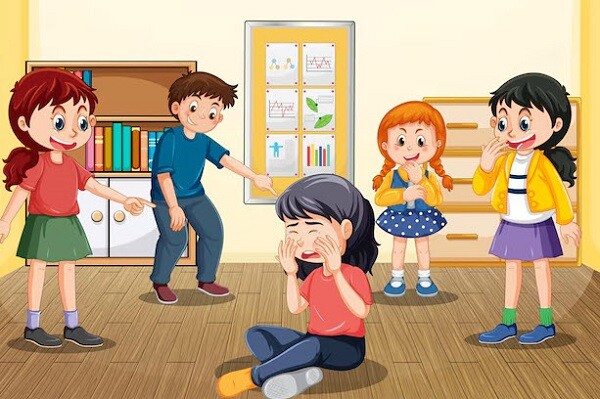Parents’ reactions to such situations have a significant impact on their children’s lives. If parents respond with empathy and a willingness to listen, their children will feel more supported and secure. On the other hand, if parents react too strongly, they may unintentionally create pressure and a sense of avoidance and fear within the child.


3 common parental reactions when they learn their child is being bullied
Teaching children to fight back immediately
Some parents may advise: “If you’re being bullied, fight back, or else people will think you’re an easy target.” This method of “fighting violence with violence” may temporarily soothe anger and provide a sense of immediate power, but it often harms both children involved and can lead to even bigger conflicts.
When children are encouraged to respond with violence, they miss out on learning healthy problem-solving skills and increase their risk of developing negative habits. Instead of developing communication and empathy, children learn that violence is the only way to demonstrate strength and assert themselves.
Teaching children to tell their teachers
“Tell your teacher if someone bullies you.” While this advice seems reasonable, it is often ineffective in practice. In a school setting, teachers typically act as mediators, but they cannot monitor every aspect of their students’ daily lives.
Teachers can intervene in specific classroom situations, but they cannot protect children around the clock, especially on their way to and from school. Therefore, children still need to be able to defend themselves.

Weak and shy children are easy targets for bullies.
Blaming the child
One of the most mistaken approaches is for parents to blame their child for being “useless” or “cowardly” when they learn their child is being bullied. Such words not only fail to help the child but also harm their self-esteem. Children feel that even their parents are not on their side, leading to feelings of insecurity and loneliness.
Children may start to believe that they are not good enough or deserving of love, which can lead to serious psychological issues in the future, such as anxiety, depression, or even self-destructive behaviors.

What should thoughtful parents do when their child is in conflict with a peer?
Teaching children to defend themselves safely
When children face physical threats, parents can teach them self-defense techniques.
If the bully is alone, the child can appropriately counter-attack to show resistance. However, counter-attacking does not have to involve violence; children can learn to use confident language to say “no” or ask the bully to stop.
However, if the bully has accomplices, counter-attacking could lead to injuries. In such cases, it is crucial to teach children to identify and seek out safe places to take refuge.
Children need to understand that sometimes, avoiding conflict is the wiser choice, and seeking help from adults or peers is necessary. Parents should guide children in identifying safe places, such as approaching a group of people, going to a teacher’s office, or finding areas with adults present.
Let your child know that you are always there to support them
When a child faces bullying, what they need most is psychological safety. The feelings of hurt and worry can make children feel lonely and insecure. Therefore, parents should assure their children that they will support them unconditionally, no matter what happens.
Encouraging children to report issues promptly and not keep them hidden is an important step in building trust. Help children understand that sharing their experiences is not a sign of weakness but rather courage.
Parents should affirm that any information shared will be heard and not judged.

Teach children self-defense skills.
Parents should intervene and seek help from multiple sources
If the bullying persists, parents should take proactive steps to address it.
Communicate with the teachers and reach out to the bully’s parents to negotiate and resolve the issue together. Find the bully’s parents and honestly express the harm their child has endured, expecting their cooperation in educating their children better.
In this way, parents can protect their children, and the bully’s parents will also become aware of the problem and work to prevent similar situations from occurring.

3 expert tips to help reduce bullying
In addition to handling the situation appropriately after it occurs, parents can also implement daily measures to boost their children’s confidence, awareness of protection, and reduce the likelihood of bullying.
Develop social skills
Teach children how to get along with their peers, communicate, and express their opinions to avoid being bullied due to shyness or weakness.

Always stand by your child and offer support.
Boost their self-confidence
Through encouragement and recognition, children will feel capable of facing difficulties and challenges instead of backing down or feeling afraid when problems arise.
Teach basic safety knowledge
For example, teach them how to protect themselves when confronted by strangers or peers outside of school and whom they should ask for help.
Children will undoubtedly face certain challenges as they grow up, and bullying is one of them. When children encounter such situations, how parents react and handle them is crucial.
Experts advise parents to remain calm, respond intelligently, and be patient to effectively protect their children and guide them in facing life’s challenges.





































